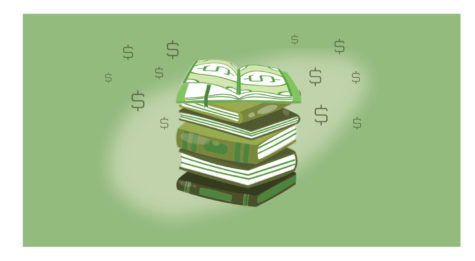OPINION | NTC Undergraduate Bundle drawbacks for Liberal Arts students
August 31, 2022

In the midst of July, transitioning from a summer mindset to a working one and considering the incoming responsibilities of the fall, Tulane University undergraduate students received an email announcing the new “NTC Undergraduate Bundle” option in the bookstore.
The new program allows students to choose between bundling their course materials and renting them for a flat rate of $25 per credit hour — for example, $375 in total if you’re taking 15 credits — or opting out of the program entirely if it does not benefit you.
The message goes on to explain that the bundle will save students “up to 50% per student per semester.” The bookstore will prepare the rental course materials in a package and send out a notification when it’s ready to be picked up or delivered; digital materials will be delivered via Canvas. When a student reaches the end of the term, they are expected to return the materials to the bookstore.
For STEM students whose textbooks may cost upwards of hundreds of dollars per course, the NTC Undergrad Bundle allows them to obtain their books at a fraction of the typical cost. This program — which Barnes & Noble has introduced at several other college bookstores — seems to be immensely beneficial to students who face high course material fees.
Liberal arts students, particularly those in the English department, have unfortunately not enjoyed the same advantages. The usual course material requirements of a liberal arts student are two to four books per class rather than one or two larger textbooks. These books can typically be purchased “used” from the Tulane University Bookstore at a lower price than from local booksellers or online marketplaces. At a rate of $25 per credit hour, the NTC Undergrad Bundle has raised the costs of course materials for the majority of English students.
Michael Kuczynski, professor of English and former chair of the Tulane English Department, said that the majority of his students “don’t view bundling as an advantage” and have noted that “it’s cheaper for them to buy their books individually.”
Michelle Kohler, associate professor of English, said, “faculty were given very little information about the new system and, as far as I know, weren’t consulted, despite the fact that it affects how and what we teach.” Kohler continued, “It’s not yet clear to me how or whether this program will affect the way our lit students can interact with texts, but given the pedagogical and content concerns, as well as our desire to be mindful of costs when we plan a course, it seems crucial to consult faculty across disciplines going forward.”
Additionally, liberal arts students are often required to interact with physical texts rather than e-books, as well as encouraged to mark and annotate their materials, which is a slightly more difficult task when using rentals.
Students are automatically enrolled in the NTC Undergrad Bundle. If a student fails to check their emails, they may not realize that their accounts receivable will be charged automatically unless they opt out of the program before Sept. 2nd.
Moreover, the bundle is seemingly presented as the superior option for the entirety of the student body, although this might not be the case. While this is the burden of the individual student to be diligent, the bookstore will hopefully emphasize the looming deadline to opt-out of the program as well as address the inconsistent benefits for particular students.
While it is no use to compare the benefits of STEM students to the drawbacks of English students, it is nevertheless unclear how much of the decision to implement the NTC Undergrad Bundle fell in the hands of the school versus Barnes & Noble College.





















Leave a Comment